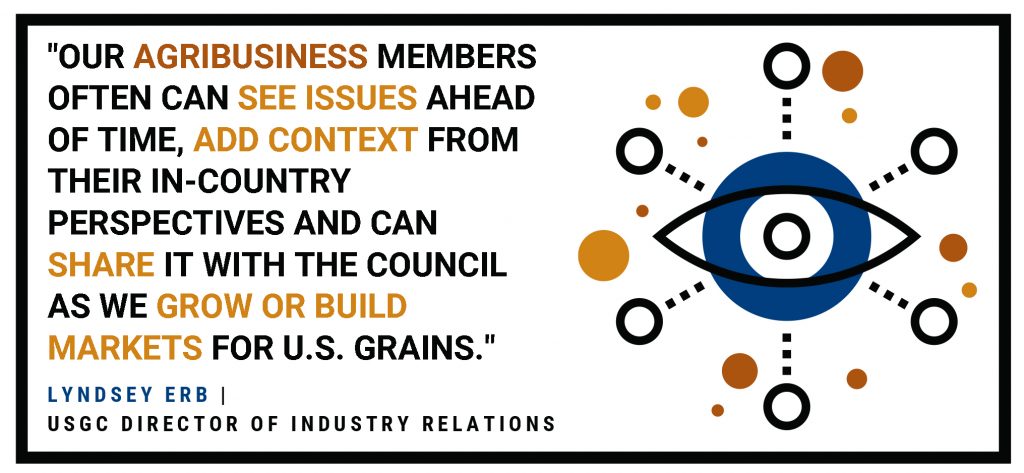The agribusiness members of the U.S. Grains Council (USGC) provide a critical perspective on new and developing markets that enhances the work made possible in cooperation with checkoff and grower member organizations and support from USDA’s Foreign Agricultural Service (FAS).
“The agribusiness sector of our membership exemplifies this year’s theme – When Trade Works, the World Wins,” said Jim Stitzlein, current USGC chairman and longtime agribusiness delegate to the Council. “Agribusiness members add diversity of perspective to the Council’s important work and being able to tap on that broader understanding in each market in which we work contributes to the Council’s and our members’ successes globally.”
From a buyers’ program in Spain for stranded sorghum shipments to phytosanitary issues assistance in Vietnam, the Council has relied on agribusiness knowledge around the world to help achieve its goals in these countries and in other markets as it enhances the trade of U.S. grain abroad.
“Agribusiness’ role in the Council is two-fold,” said Lyndsey Erb, USGC director of industry relations. “First, our agribusiness members see the value in and support the Council’s mission. Just as importantly, these members take advantage of their membership in more tangible ways – they participate in programs, contribute as subject matter experts, participate in A-teams that drive the Council’s priorities and programs and work hand-in-hand with our staff around the world and at home to create policies, programs and priorities that make sense for their businesses.”
In countries or regions where members have a business presence, agribusiness members can help identify potential markets, troubleshoot solutions to market access issues, build new relationships or creatively revise Council programs.
“Having members that represent nearly every aspect of the agribusiness value chain – from seed technology folks to equipment manufacturers to storage representatives – allows the Council staff in the United States and around the world to be more innovative and adaptive in what we are undertaking,” Erb said.
“Our agribusiness members often can see issues ahead of time, add context from their in-country perspectives and can share it with the Council as we grow or build markets for U.S. grains.”
Having a strong agribusiness sector as part of the Council’s broad membership gives Council staff access to people who work in the business of trade every day. This allows the Council to bring potential buyers overseas the most up-to-date knowledge, and it benefits the agribusiness members who are often connected to those customers through Council activities.
Collaboration between the two sets of stakeholders, in combination with others in a country or region, is especially important when resolving trade issues that periodically arise.
Agribusiness participation also benefits the Council’s advisory teams (A-Teams), the vehicle used to help set priorities for the organization. Grain producers and agribusiness representatives serve together on the Council’s seven A-Teams that cover regions or issues including Asia, Innovation & Sustainability, Ethanol, Middle/East Africa, Trade Policy, Value-Added Programs and the Western Hemisphere.
“When we have the entire U.S. export value chain present on a team, it makes for more well-rounded, thoughtful, robust programming and priorities,” Erb said. “Serving on an A-Team very much drives the programming the Council does. And that benefits both grain producers and agribusinesses directly.”
Agribusiness members also directly aid Council programming by assisting with overseas trade teams that travel to the United States to see crops firsthand, assess grain quality and gain a sense of how the U.S. value chain for corn, sorghum, barley and value-added products works. Some companies open their organizations for trade teams as a means of helping build confidence in U.S. products, strengthening business relationships with potential buyers and establishing the United States as a reliable supplier of high-quality grain. They also take the time to explain to potential customers details as diverse as logistics and quality certification.
“Agribusinesses play a critical part in our programming,” Erb said. “When we bring these influencers and buyers to the United States, we want them to have successful meetings. We can find the right agribusinesses for these overseas teams to meet with because the depth and breadth of our agribusiness members is so diverse.”
Diverse and robust participation from agribusiness members has helped and will continue to help drive the Council’s priorities and will allow the Council to expand its mission of developing markets, enabling trade and improving lives.
Read more about agribusiness’ role in the U.S. Grains Council here.
About The U.S. Grains Council
The U.S. Grains Council develops export markets for U.S. barley, corn, sorghum and related products including distiller’s dried grains with solubles (DDGS) and ethanol. With full-time presence in 28 locations, the Council operates programs in more than 50 countries and the European Union. The Council believes exports are vital to global economic development and to U.S. agriculture’s profitability. Detailed information about the Council and its programs is online at www.grains.org.

